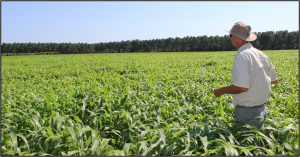By Joshua Baker, King’s AgriSeeds Southern Region Coordinator

Ask North Carolina producer Buron Lanier what his number one challenge is and he will readily tell you “the battle with old K-31 fescue.” A staple forage throughout the transition zone, K-31 grows aggressively, stands up to summer heat, tolerates overgrazing and makes great looking hay. From the outside it appears to be the perfect cool season perennial forage crop for the transition zone. However, a closer look at this lush, green forage reveals serious toxic effects on livestock.
The toxicity in K-31 is due to a naturally occurring endophyte. The endophyte is a type of fungus, whose lifecycle occurs within the tall fescue plant. It lives in a symbiotic relationship with the tall fescue plant. The fescue plant sustains the endophyte, and the endophyte in return provides protection against stressors like harsh weather conditions and overgrazing.
However, the protection that the endophyte provides the K-31 is to the detriment of livestock consuming it. In beef cattle negative effects include decreased milk production, birth weight, weight gain, pregnancy rate, and blood flow to extremities, as well as increased respiration rate and heat stress. While most concentrated in the seed head, the endophyte is found throughout the plant. Suppressing the seed head will reduce, but not eliminate the effects.
The best solution is to eradicate or remove the K-31 and replace it with a novel or endophyte free variety. Buron Lanier utilizes his annual crop rotation to battle Kentucky 31 fescue. Since he began to graze novel endophyte varieties, Buron has seen great improvements to cattle performance, especially conception rates. An annual forage system sets up a spray- smother-spray-smother rotation that battles and eradicates endophyte infected stands. Buron is seen here with AS 6501 Sorghum Sudan that was planted and grazed this past summer.
“The answer to the endophyte problem is relatively simple for livestock producers with valuable animals or those especially with sensitivity such as horses, growing beef steers, purebred beef breeding stock, and lactating dairy cows – DON’T USE ENDOPHYTE INFECTED PASTURE AND HAY.”
– Carl Hoveland, UGA The Fescue Endophyte Problem – What to do About it Now and In the Future, The Georgia Cattlemen, January 1998.
Speak to an expert at King’s AgriSeeds now at 1-717-687-6224 or email us at [email protected].
